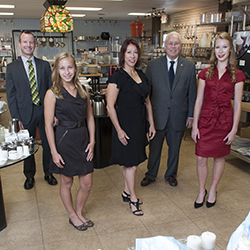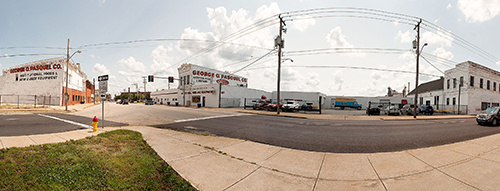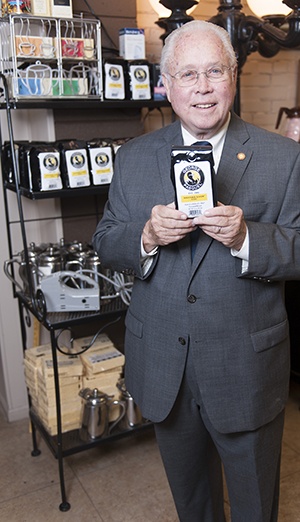
For four generations, this family business has thrived by adapting to an ever-evolving food industry while staying true to a service approach rooted in “old-fashioned kindness.”
He was told it couldn’t be done. After selling coffee for Standard Brands in Peoria for 18 years, George O. Pasquel wanted to start his own business. “You have three strikes against you,” his boss warned. “One, you’re an Italian immigrant. Two, you never graduated from eighth grade. And three, you have no money.”
And so the story goes, according to George’s son, Pete Pasquel. Ignoring the naysayer, George borrowed $5,000 from a friend and made a down payment on a white brick building at the southern end of what is today known as Peoria’s Warehouse District. Having come to the United States from Italy with his family, George floated between Springfield and Chicago before landing in Peoria in the 1920s. He founded the George O. Pasquel Company in 1946, sans high school diploma, and never looked back. “Don’t listen to anyone who says it can’t be done,” Pete declares, expressing admiration for his father’s perseverance.
That white brick structure still bears the family’s name today, along with other buildings, added as the complex expanded to encompass a two-block radius. As Peoria’s longest-standing institutional food and equipment distributor, the George O. Pasquel Company has supplied area restaurants, hospitals, nursing homes and the general public with a wide variety of food and kitchen supplies for nearly 70 years.
Commitment to Quality
“Coffee is still our biggest-selling item,” says Pete, owner and chairman, but the company has diversified over time, now offering specialty food and small-ware—small kitchen and bar appliances, tableware and utensils—while maintaining its primary focus on large-scale foods and equipment. Today, it’s a member of UniPro Foodservice, Inc., the country’s largest food-service distribution cooperative, which provides access to purchasing opportunities with premier suppliers. As one of its 650-some members, the George O. Pasquel Company buys and delivers food and supplies in bulk for its Peoria-area wholesale customers. It also specializes in the delivery and installation of gas ranges, refrigerators, coolers and other machinery necessary to get a large kitchen up and running.
Since its start, the company has carried the Nugget label; it’s Peoria’s only distributor of the brand’s line of canned foods, paper goods, frozen food and produce. Pete cites the brand’s quality standards for his company’s devotion to Nugget over the years.
“Our Nugget is known for quality,” he explains. “When you open up a can’s lid, it’s full of food—it’s not half full of water. The trouble with canned goods is… the label doesn’t tell you what’s in the can. It [lists] net weight, which is product plus liquid… What’s important is drained weight [product minus liquid], and Nugget is known for putting the most product in the can.” The customers they’ve retained over the years, he adds, know and appreciate that quality.
“We still have some schools that buy from us… and they say, ‘We want to give our kids the best food,’” Pete adds. “They want quality for their students.”

An Evolving Customer Base
Over the years, the George O. Pasquel Company’s customer base has shifted with changes in the industry. In its early days, the business thrived on servicing a small number of large companies—such as OSF, Methodist, District 150 and Caterpillar—whose hands were then free to select small, local suppliers for their expansive clientele and workforces. In fact, from the 1940s through the ‘70s, Caterpillar was the company’s biggest customer. “They had their own in-house people running their cafeterias… and they wanted to buy locally,” Pete recalls. “We were taking several truckloads a day over that bridge into East Peoria.”
But as the industry evolved, the company has had to change with it. Caterpillar, like most hospitals and school districts, long ago switched to a “mass feeder,” as Pete calls the mega-distribution companies. “We don’t have any of the hospital business anymore, and very little in nursing homes and assisted living,” explains Maria Whitson, Pete’s daughter and the company’s chief financial officer. “They’ve all gone with programs with single, larger distributors.”
“When my dad went into business in the early ‘40s, there were only two wholesale food houses in Peoria,” Pete adds. “They’re both gone… and now there are 10 or 12 of the ‘megaguys’ to replace them... We call it the ‘alphabet war’: GFS, UFS, TPC, SYSCO…” he lists. As a small independent store, the larger companies are tough to compete with, he explains.
“It’s price-driven; it’s not quality-driven. We are not, for as long as I live, going to lower our quality standards [just] to have… the cheapest price on the bid sheet,” he says firmly. Customers today—both those who’ve remained loyal over the years and the firm’s new accounts—appreciate that commitment, he adds.
Today, the company focuses on selling to central Illinois’ small, family-operated restaurants—a shrinking cohort of businesses that have been impacted by the rise of chains over the last 20 years, but are generally more conducive to partnering with other small businesses. In an effort to make up lost sales from larger clients, the company has shifted its overall strategy, expanding beyond wholesale into the retail market in an attempt to reach new audiences.
A Stocked Store
The retail store is packed: fine china, glassware, kitchen gear and cans of coffee line the shelves. A number of customers are here looking for deals on professional kitchen products and supplies, like one of the store’s best-sellers: industrial-strength baking sheets. “It’s an item that’s in every retail store in town—but not the one we have,” explains Pete. “It’s heavy and better. [It] won’t warp, and it won’t get misshapen.”
“The supplies are professional grade, but that’s what we use at home,” explains Maria, who’s squaring away marketing strategies for the company’s growing retail business by harnessing the allure of industrial-quality supplies for home use. Stainless steel tables make great additions to the home chef’s working kitchen, she says, while industrial chrome shelving can serve as a convenient garage organizer. Kitchen bus tubs store stray items more neatly in the trunk of a car, and industrial-strength kitchen gear adds high-end quality to any home cook’s repertoire.

“That’s what we want to develop… [having] people come into the store to buy a better-quality, commercial-weight pan or pot they can’t get in other retail stores,” adds Pete. In the near-future, the store also hopes to offer specialty foods and health food products. But it’s not just quality that sets the George O. Pasquel Company apart; unlike some retail shops, customers will find a warm, family-run business behind every product.
Family Ties
This summer, Maria’s daughters—Rowena, 17, and Fiona, 14—were busy learning the ropes of the family business. After previous summers spent in customer service and sales with their cousins, Maria tasked them with heavier duties this year: managing accounts receivable and learning how to apply money to the books.
“I want them to see the importance of making sure you get the money in after you’ve sold the product… and actually knowing how to apply it to the accounts,” she says, stressing the importance of understanding the financial side of the business.
“It’s been a great experience,” says Rowena, who remains intent on pursuing her acting dream in California upon graduating from high school next year. “You never know… maybe I’ll come back to work,” she says with a smile. Her little sister nods. “I’m keeping all my options open still,” she says, wise beyond her years. They have a lot to learn from their mother, who—after pursuing a degree in international studies away at college—decided to return to the family business after a formal interview with her father in 1987.
“I had not planned on coming back… but I returned with the idea that I’d try it, get some experience and if I didn’t like it, I could leave,” she recalls. “But I stayed. It was very exciting… and so diverse… No day is ever the same here.” Maria’s three sisters have all worked for the company at one time or another; Kristine Pasquel remains there today, specializing in marketing and sales.
Maria’s husband, Dan Whitson, joined the company as president in 2003 after working 13 years at OSF in engineering management. Working together all day, every day, Maria calls the separation of family and business a blurred line. “There’s not a hard line. There can’t be, because there are so many things that can’t get done in the quote unquote ‘business day.’” That means a lot of business discussions at home, and decision-making that transcends the walls of the business. But working together, the family dynamic is well-balanced.
“We all have different strengths,” Maria explains. “Dan is the ‘systems guy.’ He’s very tech-savvy and likes to think through… how you’re going to orchestrate something.” He’s also very calm in any situation involving customers or employees, Pete quickly adds.
“I’m the people guy,” says Pete. “I like to have the person say to me, ‘I can’t buy your stuff, Pete, because you’re too high.’ And I like to say to them, ‘No, you can’t afford not to buy my stuff. Sit down here and give me five minutes to explain why.’”
Maria has a “good feeling for the business,” he adds. Having worked in sales both outside and inside the company, she knows both ends of the industry. “Maria’s very good with people, too… but she has a different approach than I do,” says Pete. “She’s tomorrow’s business. I’m yesterday’s business. I’m on the way out.”
Maria smiles. “I’m just trying to think about how we get to the next step of this new transition,” she says, outlining the company’s shift into retail. Despite the challenges, she stresses the importance of maintaining their core values. “We like to treat people how we like to be treated.”
Giving First
That dedication to service is evident in the store’s commitment to its customers. “We still carry things out and put them in the car for customers,” Pete says. “We try to give them old-fashioned service here.”
“And we treat everybody kindly,” adds Maria. It sounds simple, but a lot of stores have strayed from that path, they suggest. “I hate when you go in a store and ask, ‘Where’s so and so?’ And they say, ‘It’s in the third aisle over there… Go help yourself!’ That’s not going to happen here,” says Pete. At George O. Pasquel Company, the customer—and community—always comes first, just like the name on the sign. Alongside his commitment to providing quality food products and equipment, the company’s founder was equally committed to his community, lending a helping hand wherever he could and instilling a volunteer ethic into his son that has lasted through the generations.
“What we’re most proud of, besides our accomplishments as a business, are the folks we’ve helped,” Pete says, describing some of the accolades it has received over the years for its service to local schools, churches and community organizations. After winning the Lewis J. Burger Outstanding Volunteer Fund Raiser award from the local chapter of the Association of Fundraising Professionals in 1995, Pete and the company have since received the CWTC Humanitarian and Business Partnership awards and the Heart of Illinois Hospitality Association’s Friend of the Year award.
In addition, Pete was inducted into the African American Hall of Fame with a business award for his friendship. “I’ve put a lot of minority people in business over the years,” he says. “I was proud of that and still am—because I’m still a part of it. The community respects us and knows what we’re trying to do here.
“My education from my father, and my education to my daughter, and her education to her daughters… [are based in] helping and giving back to the community.” And that’s exactly what the George O. Pasquel Company—founded by a humble Italian immigrant who never completed high school—has done for 68 years. iBi

